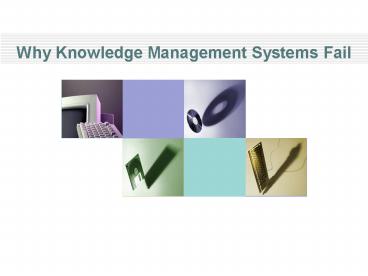Why Knowledge Management Systems Fail - PowerPoint PPT Presentation
1 / 25
Title:
Why Knowledge Management Systems Fail
Description:
Knowledge-based strategies. Foundation of trust. Reduce management of control over information ... Knowledge-based strategies. Begin with strategy, not knowledge ... – PowerPoint PPT presentation
Number of Views:81
Avg rating:3.0/5.0
Title: Why Knowledge Management Systems Fail
1
Why Knowledge Management Systems Fail
2
What is Knowledge ?
3
Types of Knowledge
- 1. Explicit
2. Tacit
4
Explicit Knowledge
- Codified
- Easy to capture
Documents
Customer Queries
5
Tacit Knowledge
- Resides in experts head
- Inferred
- Not easy to capture
6
Knowledge Ratio
7
Knowledge Life Cycle
Explicit
Implicit
Knowledge Life Cycle
8
Knowledge Management Framework
PLAN
Create New Knowledge
Organize
Access
Use
Create
Capture
Information
9
- http//www.tdan.com/i009hy0401.gif
10
Why Do KM Systems Fail?
1. Technology
2. Content
3. Work Issues
4. Culture
11
- Emphasis on Technology Rather than People
- Collected almost solely explicit data
- IT led elaborate systems were built
- Costly to maintain
- Not readily adaptable
- Little to no behavioral engineering
- Collecting tacit data difficult
12
Problems with Technology
- Difficult to keep up with hardware requirements
- Lack of compatibility between diverse IT systems
and processes - Resulting KM tool was cumbersome or too
complicated - Inadequate training and lack of technical support
- Replications of errors in data or data obsolete
13
Content Procurement
- Burden of knowledge management work on producers
of knowledge instead of consumers - Expert employees must stop their real work to
do knowledge work (define their tacit knowledge) - Assumptions made regarding end-user
- Cross-functional content often missed
- Knowledge gaps occur
14
Work Issues
- No clear connection between knowledge management
strategy and the overall company goals - Separated from real work
- User saw no benefit from utilizing the system
- System hindered daily work
15
Culture
16
Personal Culture
- Human nature to hoard knowledge
- Job security
- Too time consumptive
- True cultural barriers
- Language
- Education level
- Status in organization
17
Group Culture
- Interdepartmental politics
- Budget security
- Departmental competitiveness
- Information hoarding (power play)
- No high level sponsor
18
Organizational Culture
- Building on anothers knowledge viewed as lack of
creativity - Accessing the KM base was perceived as sign of
inadequacy - Contributing to the KM base was perceived by the
employee as a loss in personal expertise - Not invented here
- No high level sponsor
19
How KM Systems Can Succeed
- Knowledge-based strategies
- Foundation of trust
- Reduce management of control over information
- Encourage/reward the flow of information
- Metrics outcomes from the flow of information
20
How KM Systems Can Succeed
- Knowledge-based strategies
- Begin with strategy, not knowledge
- Strategies are not strategies unless you can link
them to standard measures of performance - Its not about managing knowledge its about
nurturing people with knowledge - Leverage knowledge through a network of people
who collaborate, not networks of technology that
interconnect - Leverage knowledge through organizational pull
rather than centralized information push
21
How KM Systems Can Succeed
- Foundation of trust
- Biggest cultural issue
Lack of TRUST
22
How KM Systems Can Succeed
- Reduce management of control over information
23
How KM Systems Can Succeed
- Encourage the flow of information
- Organize around knowledge flow, not by
departments or location - One-step transmission
- Universal access (24/7)
- Universal entry
- Ease of use
- Security
- Sharing information
- Performance measurement
- Reward system
24
How KM Systems Can Succeed
- Metrics outcomes from the flow of information
- Measure what you want
- Customer satisfaction
- Productivity
- Employee development and growth
- Costs
- Revenue
- MLGW performance indicators
25
CONCLUSION
- Human beings have an infinite ability to create
knowledge. Add the convenient fact that unlike
conventional assets, knowledge grows when it is
sharedwhich will change how we manage in the
Knowledge Era. - Nabors, Melody L., Why Knowledge Management
Systems Fail A Review of the Literature,
Christian Brothers University, November 2006. - Buckman, Robert H., Building a Knowledge-Driven
Organization, McGraw-Hill, 2004.































